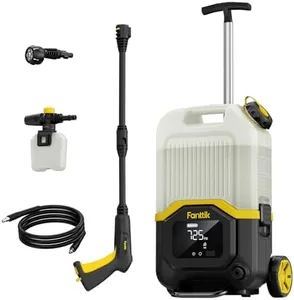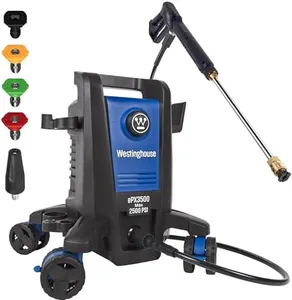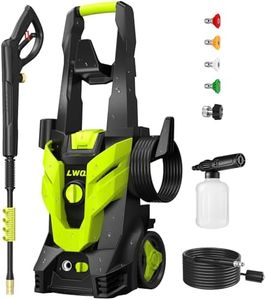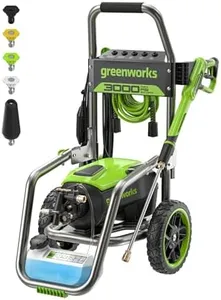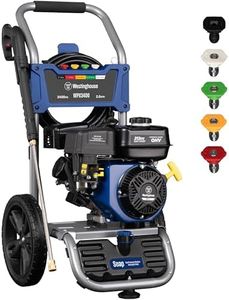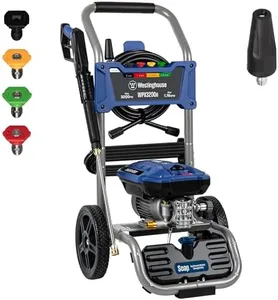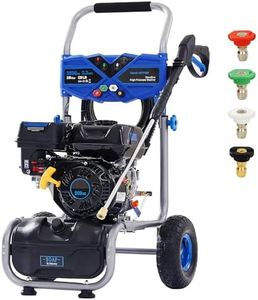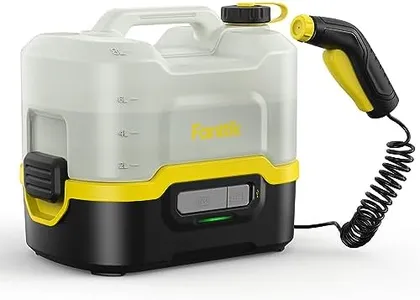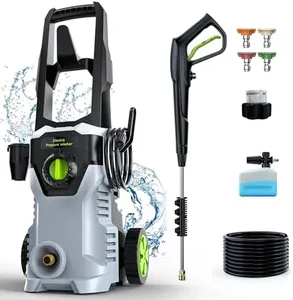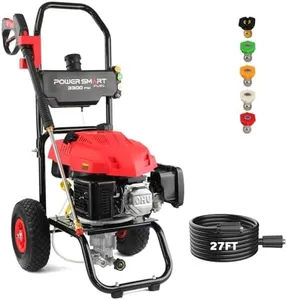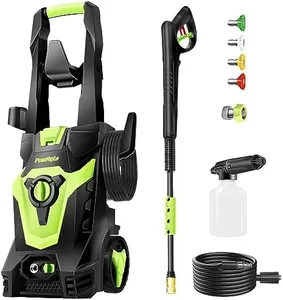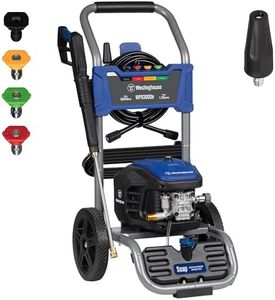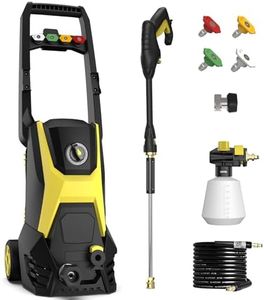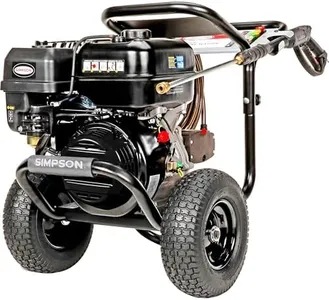10 Best Power Washers 2025 in the United States
Our technology thoroughly searches through the online shopping world, reviewing hundreds of sites. We then process and analyze this information, updating in real-time to bring you the latest top-rated products. This way, you always get the best and most current options available.

Our Top Picks
Winner
Westinghouse ePX3500 Electric Pressure Washer, 2500 Max PSI 1.76 Max GPM with Anti-Tipping Technology, Onboard Soap Tank, Pro-Style Steel Wand, 5-Nozzle Set, for Cars/Fences/Driveways/Home/Patios
Most important from
5070 reviews
The Westinghouse ePX3500 Electric Pressure Washer is a solid choice for homeowners looking to tackle various cleaning tasks like cars, patios, and driveways. With a maximum pressure of 2500 PSI and a flow rate of 1.76 GPM, it offers ample cleaning power to remove dirt and grime effectively. The five quick-connect nozzles, including a turbo option, provide versatility for different surfaces and cleaning needs.
Portability is one of the standout features, as this unit is lightweight at just 19 pounds. Its compact design and anti-tipping technology, aided by four locking wheels, make it easy to maneuver and store. The 25-foot nylon-braided hose also adds to the convenience, allowing for a good reach without needing to move the washer frequently.
The onboard soap tank is another advantage, letting you add detergents for more intensive cleaning tasks. Moreover, the pump’s automatic shut-off feature conserves energy and helps extend the pump's life, which is a nice touch for eco-conscious users. However, it may struggle with heavy-duty projects compared to higher PSI gas-powered models. Additionally, being electric means you will need access to a power outlet, which might be a limitation for some users.
Most important from
5070 reviews
LWQ Electric Pressure Washer, 2.5 GPM Power Washer with 4 Quick Connect Nozzles, High Pressure Cleaning Machine with Foam Cannon for Cars/Fences/Driveways/Patios/Home Cleaning (Green)
Most important from
2670 reviews
The Electric Pressure Washer by LWQ offers a strong cleaning performance with an impressive 4200 PSI and a 2.5 GPM flow rate. This makes it highly effective for cleaning various surfaces like driveways, patios, and cars. The included four quick-connect nozzles offer flexibility for different cleaning tasks, ranging from a concentrated blast to a wider spray. Additionally, the foam cannon allows for easy application of detergents, ideal for tougher cleaning jobs or delicate surfaces that need a gentler touch.
The washer's 23-foot hose and 36-foot power cord provide ample reach, reducing the need to frequently move the unit during use. The two rollers and anti-tipping design enhance its portability and stability, making it easy to maneuver and use even on uneven terrains. However, at 19.9 pounds, it might be a bit cumbersome for some users to carry over long distances. The compact design and storage hooks for the power cord and nozzles help in keeping everything organized when not in use.
Despite its strengths, users should be aware that the power source is AC/DC, which means it needs an electrical outlet nearby, potentially limiting its use in remote areas. Additionally, while the high PSI and GPM are great for heavy-duty cleaning, they might be too powerful for delicate surfaces, so users need to choose the appropriate nozzle carefully.
Most important from
2670 reviews
Greenworks Pro Brushless 3000 PSI (CSA Certified) 2.0 GPM Max / 1.1 GPM Electric Pressure Washer (Foldable Handles, Rugged Steel Frame, 25 FT Hose, 35 FT GFCI Power Cord)
Most important from
3711 reviews
The Greenworks Pro Brushless 3000 PSI Electric Pressure Washer is designed to deliver robust cleaning power, making it a strong contender for tackling tough outdoor cleaning jobs. With a TruBrushless motor capable of generating up to 3000 PSI and 2.0 GPM, this washer offers substantial pressure and flow, useful for deep cleaning and removing stubborn dirt. Additionally, the JettFlow technology enhances its cleaning efficiency by offering up to 50% more flow for reaching higher and hard-to-access areas.
On the practicality front, it comes with a 25-foot Uberflex kink-resistant hose and a 35-foot GFCI power cord, allowing for considerable reach around your workspace. The inclusion of multiple nozzles (15°, 25°, 40°, soap, and turbo) adds versatility, enabling it to cater to varied cleaning tasks—from gentle rinsing to concentrated jet cleaning.
However, at 55.5 pounds, it may not be the most portable option for users who need to move it around frequently. The foldable handles and rugged steel frame do enhance its sturdiness and storage convenience, but its weight might still pose a challenge for some. The electric power source also means you're tethered to an outlet, which could limit mobility when compared to gas-powered alternatives.
Most important from
3711 reviews
Buying Guide for the Best Power Washers
Choosing the right power washer can make a big difference in how effectively and efficiently you can clean various surfaces. Power washers, also known as pressure washers, use high-pressure water spray to remove dirt, grime, mold, and other contaminants from surfaces like driveways, decks, and vehicles. To find the best power washer for your needs, it's important to understand the key specifications and how they relate to your specific cleaning tasks.FAQ
Most Popular Categories Right Now
